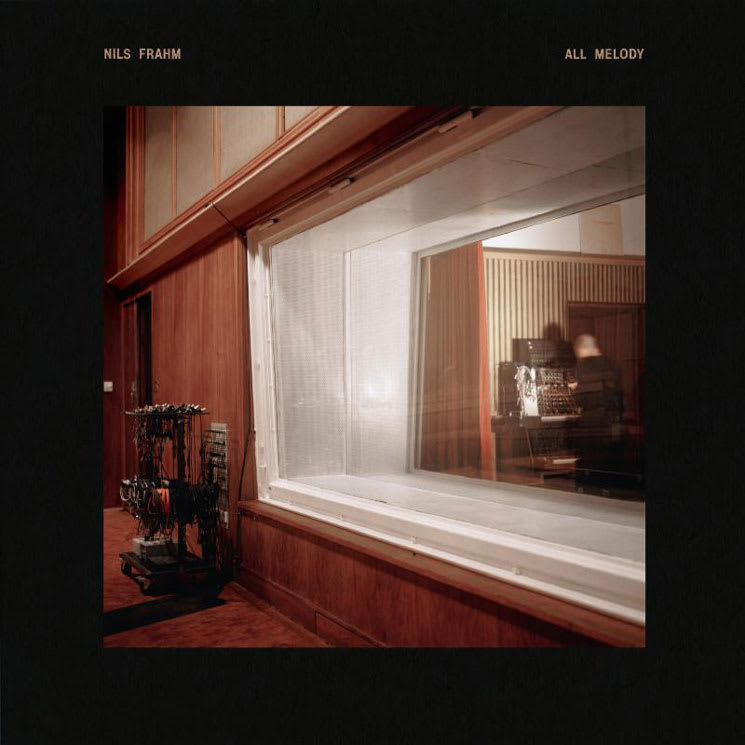One hand on a grand piano, another on a Juno-60, Nils Frahm consistently challenges the expectations surrounding form and content.
The context for this new release is front and centre on the album artwork: Frahm spent the past two years deconstructing and building up a studio space in East Berlin's historic Funkhaus recording complex from scratch, custom tuned to the sprawling vision he built around the sketches he's had in his live repertoire for "All Melody" and "#2" since 2014.
Unlike previous releases that documented Frahm reckoning with acoustic parameters set by others in real time (Solo was recorded across four days improvising on David Klavins' 12-foot-tall upright; Spaces was culled from two years of live performances in different concert environments) — parameters Frahm embraces humbly and enthusiastically — here, Frahm is intimately acquainted with the acoustic idiotypes he's interacting with.
A studio album in the truest sense, it's Frahm at his most comfortable and liberated, rife with the kind of experimentation we can expect from him — acoustic instruments imitating electronic ones, and vice versa — taken to an ambitious new level. While Frahm previously only leaned on his MIDI-controlled pipe organ for long, droning notes, here, he's tapped into its percussive qualities and rigged it into a drum machine, programming an actual drum machine to sound like an orchestra of breathy flutes, both used to uniquely propulsive effect on tracks like "Sunson" and "A Place." Elsewhere, he's brought in trumpets and cello, and in collaboration with Kieran Brunt and the Barbican's Chris Sharp, he's even incorporated choral vocals that greet the listener.
Bookended with spacious passages of silence, All Melody might be the most open-ended, maximalist survey of Frahm's practice yet, and the titles and sounds across its four sides of vinyl take listeners on a lyrical, ambient narrative unlike any he's offered before. Hints of Reichian minimalist instrumentation, dub electronics, and the influence of Vangelis's Blade Runner theme can be heard throughout, while fans of the patient, imaginatively recorded acoustic piano treatments Frahm offered on Felt and Screws will be pleased, too.
It's an impressive compilation of provocatively disparate ideas, but taken in in its intended order, there's a mesmerizing continuity to it all.
(Erased Tapes)The context for this new release is front and centre on the album artwork: Frahm spent the past two years deconstructing and building up a studio space in East Berlin's historic Funkhaus recording complex from scratch, custom tuned to the sprawling vision he built around the sketches he's had in his live repertoire for "All Melody" and "#2" since 2014.
Unlike previous releases that documented Frahm reckoning with acoustic parameters set by others in real time (Solo was recorded across four days improvising on David Klavins' 12-foot-tall upright; Spaces was culled from two years of live performances in different concert environments) — parameters Frahm embraces humbly and enthusiastically — here, Frahm is intimately acquainted with the acoustic idiotypes he's interacting with.
A studio album in the truest sense, it's Frahm at his most comfortable and liberated, rife with the kind of experimentation we can expect from him — acoustic instruments imitating electronic ones, and vice versa — taken to an ambitious new level. While Frahm previously only leaned on his MIDI-controlled pipe organ for long, droning notes, here, he's tapped into its percussive qualities and rigged it into a drum machine, programming an actual drum machine to sound like an orchestra of breathy flutes, both used to uniquely propulsive effect on tracks like "Sunson" and "A Place." Elsewhere, he's brought in trumpets and cello, and in collaboration with Kieran Brunt and the Barbican's Chris Sharp, he's even incorporated choral vocals that greet the listener.
Bookended with spacious passages of silence, All Melody might be the most open-ended, maximalist survey of Frahm's practice yet, and the titles and sounds across its four sides of vinyl take listeners on a lyrical, ambient narrative unlike any he's offered before. Hints of Reichian minimalist instrumentation, dub electronics, and the influence of Vangelis's Blade Runner theme can be heard throughout, while fans of the patient, imaginatively recorded acoustic piano treatments Frahm offered on Felt and Screws will be pleased, too.
It's an impressive compilation of provocatively disparate ideas, but taken in in its intended order, there's a mesmerizing continuity to it all.
